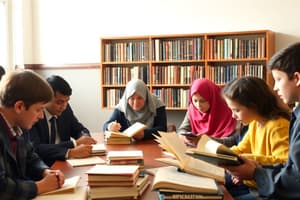Podcast
Questions and Answers
During the Renaissance, what major reform was integrated into national governments?
During the Renaissance, what major reform was integrated into national governments?
- Compulsory elementary schooling (correct)
- Mandatory military training
- Exclusive focus on vocational training
- Emphasis on physical education
Which European Enlightenment figure advocated for universal education?
Which European Enlightenment figure advocated for universal education?
- Machiavelli
- Rousseau (correct)
- Galileo
- Da Vinci
Who formulated kindergarten concepts that influenced modern educational structures?
Who formulated kindergarten concepts that influenced modern educational structures?
- Isaac Newton
- Marie Curie
- Friedrich Froebel (correct)
- Voltaire
What did Maria Montessori base her pedagogical methodology on?
What did Maria Montessori base her pedagogical methodology on?
In modern times, which aspect influenced the adaptation of Western models in countries like Japan and South Korea?
In modern times, which aspect influenced the adaptation of Western models in countries like Japan and South Korea?
What is the fundamental purpose of modern educational systems according to the text?
What is the fundamental purpose of modern educational systems according to the text?
Which type of educational system did Confucian scholars develop in ancient China?
Which type of educational system did Confucian scholars develop in ancient China?
What were students able to study in ancient Greek academies established by philosophers?
What were students able to study in ancient Greek academies established by philosophers?
During medieval times, which cathedral school later transformed into the University of Paris (Sorbonne)?
During medieval times, which cathedral school later transformed into the University of Paris (Sorbonne)?
What role did monastic education play during medieval times in Europe?
What role did monastic education play during medieval times in Europe?
Which aspect of education was emphasized in monastery learning centers during medieval Europe?
Which aspect of education was emphasized in monastery learning centers during medieval Europe?
What was a key feature of the Chinese educational system developed by Confucian scholars?
What was a key feature of the Chinese educational system developed by Confucian scholars?
Flashcards are hidden until you start studying
Study Notes
Civilization and Education: Exploring Educational Systems
Throughout history, civilization has been closely intertwined with education—a critical component of human progress and societal development. In this exploration, we'll delve into how various societies have structured their educational systems across civilizations and how these designs have shaped our understanding of knowledge, skills, and values today.
Early Approaches to Education
Education in ancient cultures often consisted of apprenticeships, oral traditions, or religious schools fostering specific sets of beliefs and practices within communities. For example, ancient Greek philosophers established academies where students could study mathematics, literature, rhetoric, and other domains deemed essential for an educated citizenry. Similarly, Confucian scholars developed the Chinese system of rote memorization called jiaoshi to impart traditional cultural knowledge.
Medieval Education
Medieval Europe saw the rise of cathedral schools and monastery learning centers, providing basic literacy, numeracy, and religion-based instruction. These establishments laid the foundation for later universities like Paris' Notre Dame Cathedral School, which transformed into the University of Paris (Sorbonne) during medieval times. Monastic education played a pivotal role during this period, encouraging scholarship through scriptoria, libraries, and manuscript copying.
Renaissance and Enlightenment Periods
The Renaissance brought renewed emphasis on classical studies, leading to individualized learning and increased accessibility to higher education. This era coincided with major reforms such as integrating compulsory elementary schooling into national governments, emphasizing practical skills alongside the classics in curriculum design. Some of the most notable figures from the European Enlightenment championed universal education, including Rousseau, Comenius, and Kant.
Modern Times and Global Perspectives
In modern eras, educational institutions evolved towards more democratized structures, aiming to deliver equitable opportunities worldwide. Prussian educator Friedrich Froebel formulated kindergarten concepts, while Maria Montessori developed her own unique pedagogical methodology based on hands-on activities in Italy and beyond. As globalization accelerated, processes came full circle when countries like Japan, South Korea, China, and India adapted Western models to promote academic excellence and industrial competitiveness.
Contemporary Landscape
Modern educational systems continue to evolve, incorporating new technologies, multicultural perspectives, and innovative teaching methods. On one hand, digital learning platforms expand accessibility through online courses; on the other, cultural diversification challenges traditional curricula to reflect multiple worldviews. Despite ongoing changes, the fundamental purpose remains unchanged — preparing learners to become informed citizens who can critically engage with society and contribute positively to the future.
Conclusion
As civilization continues its trajectory, education will undoubtedly shape the destiny of humanity by shaping minds, infusing wisdom, and cultivating virtues required for coexistence and sustainable progress. By investigating the roots of educational systems throughout time, we gain deeper insights into both past achievements and potential futures, thus empowering us to better understand our needs and aspirations for tomorrow's world.
Studying That Suits You
Use AI to generate personalized quizzes and flashcards to suit your learning preferences.




